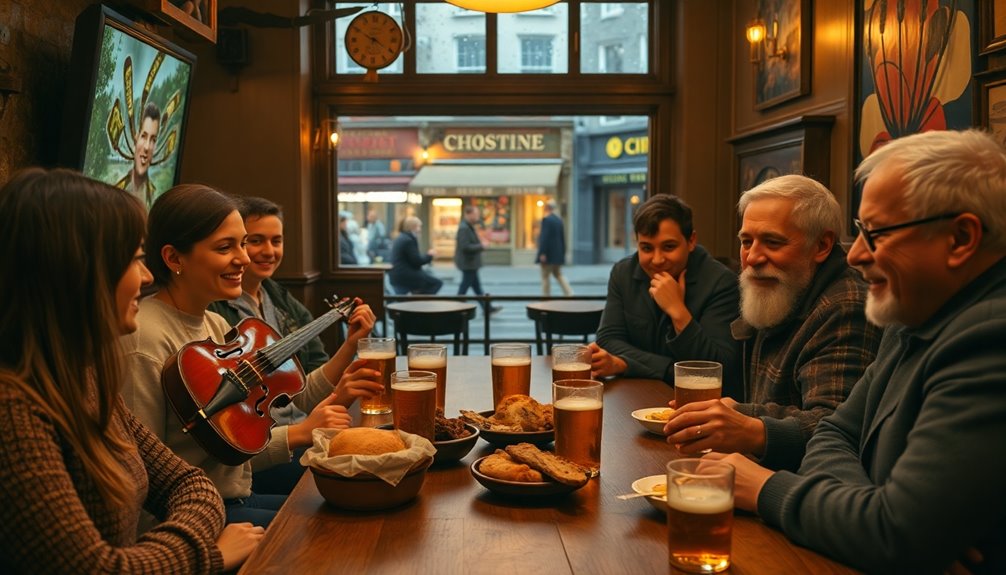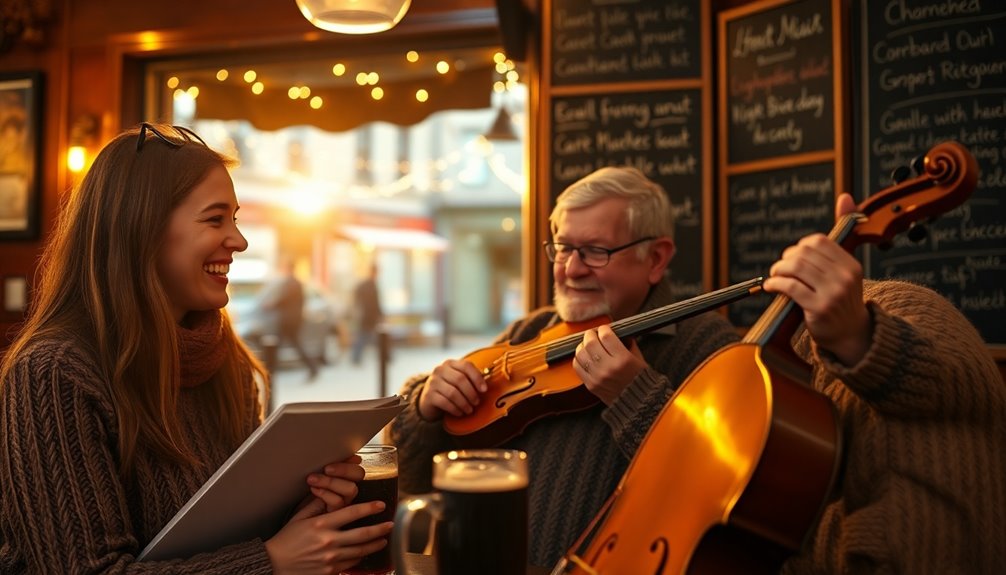
Immersing yourself in Irish traditions—sessions, ceilidhs, Gaelic games and seasonal festivals—gives you practical social capital and quicker cultural fluency than classrooms alone. You’ll learn local norms, nonverbal cues and community etiquette while building networks that can lead to collaborations, jobs and friendships. Volunteering and basic Irish phrases signal respect and open doors, but you’ll need humility and time to earn trust. Keep going to uncover specific strategies and mindful pitfalls for effective engagement.
Highlights
- Join traditional music sessions to build mentorships, academic contacts, and cultural friendships through listening, playing, and collaborative learning.
- Attend ceilidh dances to practice social etiquette, read nonverbal cues, and strengthen inclusive community ties.
- Participate in Gaelic games and pitch-side rituals to integrate into local teams, gain trust, and experience communal belonging.
- Volunteer at seasonal festivals and parades to observe national identity respectfully, network, and learn community priorities.
- Learn basic Irish phrases and practice with locals to show respect, deepen conversations, and foster cultural humility.
Embracing Traditional Music Sessions for Networking
While you might see traditional Irish music sessions as just lively entertainment, they’re actually strategic networking spaces where informal interactions often lead to academic collaborations, job leads, and deeper cultural integration. You’ll notice traditional instruments drawing both locals and internationals into shared rhythms, letting you observe social hierarchies and mentorship dynamics among local musicians. If you engage critically — listening, asking informed questions, offering help — you’ll convert conviviality into purposeful connections without losing autonomy. Be selective: prioritize sessions aligned with your interests, respect norms, and treat relationships as reciprocal. That approach maximizes learning, opportunity, and genuine cultural exchange.
Joining Local Ceilidh Dances to Build Community
A ceilidh isn’t just a folk dance night—it’s a structured social practice where movement, call-and-response calls, and partner-switching encode community norms and inclusion strategies you can learn from. You’ll analyze how dance etiquette governs consent, turn-taking, and respect, giving you clear frameworks to navigate unfamiliar social spaces. Participating teaches you to read nonverbal cues, adapt quickly, and contribute to community bonding without sacrificing autonomy. Critically, you should question power dynamics—who leads, who’s excluded—and use that awareness to choose events aligning with your values. Engaging intentionally lets you expand networks, practice cultural humility, and claim freedom within collective ritual.
Exploring Gaelic Games for Active Integration
Moving from ceilidh rooms into playing fields reveals another set of embodied social rules you can use to integrate: Gaelic games—hurling, camogie, and Gaelic football—operate as communal institutions where teamwork, local affiliation, and informal mentorship shape belonging. You’ll find Gaelic culture embedded in everyday rituals: pitch upkeep, post-match tea, and blunt feedback. Joining local leagues forces you to reconcile individual freedom with collective discipline, sharpening teamwork skills and exposing sportsmanship values that aren’t merely moral but practical. Critically, participation grants access to social networks, but you’ll need humility and time to navigate unwritten codes and earn reciprocal trust.
Participating in St. Patrick’s Day and Seasonal Festivals
When you join parades and ceilidhs, you’re not just watching culture — you’re negotiating space in communal rituals and observing who’s included or excluded. Tasting seasonal traditional foods offers sensory evidence of local identity and economic rhythms, but also raises questions about authenticity and commercialization. Volunteering at community events lets you contribute and learn, provided you critically assess whether your presence supports meaningful exchange or unintentionally displaces local agency.
Join Parades and Ceilidhs
Parades and ceilidhs offer more than festive spectacle; they’re immersive sites where you can observe how national identity, local history, and community networks get performed and negotiated in public. You should approach them with awareness: learn parade etiquette to avoid tokenizing traditions or disrupting processionary meanings. At ceilidhs, respect ceilidh costumes and local norms while joining dances—your participation alters the event’s social dynamics. Critically assess your role as visitor versus participant, balancing curiosity and restraint. These gatherings let you study informal power, memory, and belonging firsthand, offering liberating insights if you engage ethically and reflectively.
Taste Seasonal Traditional Foods
After watching a parade or joining a ceilidh, you’ll notice how food punctuates public ritual and private memory—so tasting seasonal dishes becomes another way to read social meanings. You should approach St. Patrick’s Day and harvest festivals as ethnographic moments: sample dishes rooted in traditional recipes, ask why ingredients recur, and note who prepares them. Visit food markets to see commerce and conviviality intersect; vendors reveal local taste hierarchies and seasonal cycles. Don’t romanticize; critique commodification and tourist packaging while seeking authentic exchanges. In doing so you gain cultural literacy, autonomy, and a subtler, freer appreciation of place.
Volunteer at Community Events
If you step beyond spectator mode and volunteer at St. Patrick’s Day parades or seasonal festivals, you’ll test assumptions about community rituals and your role within them. You’ll engage in community outreach that’s practical, not performative, learning logistics, crowd dynamics, and local priorities. That work creates authentic cultural exchange: you give time and gain nuanced perspectives on identity, history, and contemporary challenges. Critically assess power dynamics—who benefits, whose narratives are center stage—and choose roles that support inclusion. Volunteering offers freedom to act responsibly, build networks, and reflect; it’s an empirical way to deepen learning, not just collect experiences.
Volunteering at Community Cultural Events
When you sign up to volunteer at community cultural events, you’re stepping into a role that can reshape both your understanding of Irish traditions and the way locals perceive visiting students. You’ll evaluate how community service functions beyond goodwill — as infrastructure supporting festivals, music sessions, and parades — and decide where your labor genuinely aids residents versus staging tourist-friendly displays. Treat participation as cultural exchange, not consumption: critique event organization, ask who benefits, and suggest inclusive practices. That mindset preserves your freedom to engage ethically, deepens mutual respect, and helps you leave a constructive footprint while learning responsibly.
Learning Basic Irish Phrases to Deepen Connections

Anyone can learn a few Irish phrases to signal respect and curiosity, but doing so thoughtfully matters: simple greetings and place names open doors only if you understand their cultural weight and local usage. You should focus on basic greetings and pronunciation, but also learn when to use them—formal versus casual, anglicized names versus Gaeilge. That discernment shows cultural appreciation rather than performative mimicry. Practice with locals, ask about meanings, and accept correction. Be critical of tokenism: a phrase isn’t a passport to intimacy. Used responsibly, language becomes a tool for deeper, freer connection and mutual respect.
Some Questions Answered
How Can I Find Traditional Music Sessions Near My Campus?
Search campus boards, social media groups, and students’ union pages to find traditional music sessions at local venues; you’ll spot posters, event listings, or recurring session nights. Critically assess venue vibe, accessibility, and whether sessions are open or invite-only. Talk to music students and local pubs for insider tips, and triangulate schedules to avoid tourist traps. That way you’ll choose authentic, respectful gatherings that suit your freedom-seeking style.
Are Ceilidh Dances Suitable for Absolute Beginners?
Yes — by coincidence, the first person you meet at a ceilidh might be your perfect teacher, so you’ll see it’s totally accessible. You’ll want to learn ceilidh etiquette and follow beginner tips like watching briefly, asking for guidance, and staying relaxed. Critically assess dances before joining, pace yourself, and refuse pressure to perform. This frees you to experiment, enjoy communal rhythm, and grow confident without sacrificing autonomy.
Do Gaelic Games Require Prior Athletic Experience to Join?
No, Gaelic games don’t require prior athletic experience to join. You’re assessed on potential and enthusiasm rather than elite skill; clubs emphasize Gaelic sports’ athletic inclusivity, offering beginner sessions and tailored drills. Critically, some competitive tiers demand fitness, so you’ll face selection pressure, but community clubs nurture development, coaching technique and conditioning. If you value freedom to learn and grow, you’ll find pathways in most clubs—just be prepared to train and commit.
Can I Attend St. Patrick’s Events as a Non-Student?
Yes — you can usually attend St. Patrick’s events as a non-student; St. Patrick’s participation often welcomes the wider public. You should assess event specifics critically: some campus activities might restrict access, while parades and city ceremonies prioritize community involvement. If you value freedom, pick open events, check organizers’ policies, and respect local customs. Engaging thoughtfully maximizes cultural exchange without assuming automatic inclusion or overlooking logistical limits.
Where Can I Practice Irish Phrases With Native Speakers?
You can practice Irish phrases with native speakers at local language exchange meetups, conversation clubs in community centers, university groups, or online platforms linking learners and fluent speakers. Critically evaluate each option for authenticity, participant motivation, and frequency; conversation clubs often offer structured practice, while language exchange gives reciprocal freedom to lead topics. Choose spaces that respect your autonomy, seek feedback, and prioritize regular, meaningful interaction to build real conversational fluency.
Summing Everything Up
You’ll find that the old and the new sit side by side: lively céilí floors pulse beside quiet pubs where songs stitch strangers into friends. By blending music, sport, language and service you don’t just visit Ireland — you lodge yourself in its rhythms, testing assumptions about community and identity. Be critical about what you join and why, but open to surprise; that tension between curiosity and respect will deepen your study-abroad experience.
